Nursing Leadership Essay: Leadership and Nursing Shortage in Canada
VerifiedAdded on 2022/08/26
|8
|1896
|24
Essay
AI Summary
This essay delves into the critical issue of nursing leadership within the Canadian healthcare system, specifically addressing the concerning shortage of nurses. It highlights the importance of effective leadership in fostering a positive work environment, motivating staff, and achieving organizational goals. The paper examines leadership challenges, emphasizing the need for strong leadership to mitigate the shortage. It introduces key leadership concepts, including transactional and transformational leadership, and explores their application in the nursing profession. The essay discusses how these leadership styles can attract and retain nurses, ultimately improving the healthcare system. It emphasizes the need for nurses to incorporate these leadership concepts to enhance their leadership skills, motivate their teams, and provide quality patient care. The essay concludes by underscoring the significance of leadership in addressing the nursing shortage and ensuring the long-term sustainability of the Canadian healthcare system.

Running head: NURSING LEADERSHIP
NURSING LEADERSHIP
Name of the Student
Name of the University
Author Note
NURSING LEADERSHIP
Name of the Student
Name of the University
Author Note
Paraphrase This Document
Need a fresh take? Get an instant paraphrase of this document with our AI Paraphraser
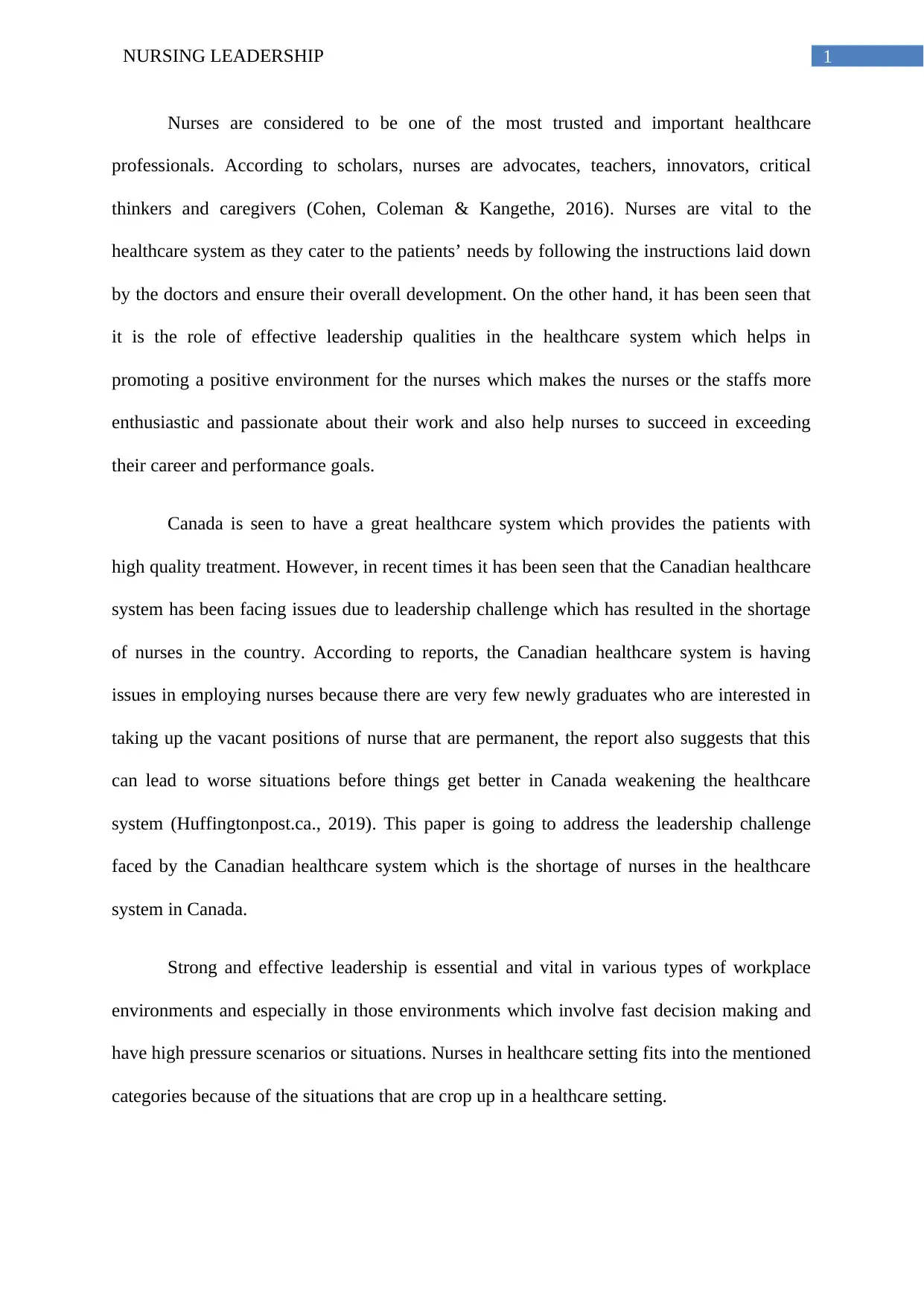
1NURSING LEADERSHIP
Nurses are considered to be one of the most trusted and important healthcare
professionals. According to scholars, nurses are advocates, teachers, innovators, critical
thinkers and caregivers (Cohen, Coleman & Kangethe, 2016). Nurses are vital to the
healthcare system as they cater to the patients’ needs by following the instructions laid down
by the doctors and ensure their overall development. On the other hand, it has been seen that
it is the role of effective leadership qualities in the healthcare system which helps in
promoting a positive environment for the nurses which makes the nurses or the staffs more
enthusiastic and passionate about their work and also help nurses to succeed in exceeding
their career and performance goals.
Canada is seen to have a great healthcare system which provides the patients with
high quality treatment. However, in recent times it has been seen that the Canadian healthcare
system has been facing issues due to leadership challenge which has resulted in the shortage
of nurses in the country. According to reports, the Canadian healthcare system is having
issues in employing nurses because there are very few newly graduates who are interested in
taking up the vacant positions of nurse that are permanent, the report also suggests that this
can lead to worse situations before things get better in Canada weakening the healthcare
system (Huffingtonpost.ca., 2019). This paper is going to address the leadership challenge
faced by the Canadian healthcare system which is the shortage of nurses in the healthcare
system in Canada.
Strong and effective leadership is essential and vital in various types of workplace
environments and especially in those environments which involve fast decision making and
have high pressure scenarios or situations. Nurses in healthcare setting fits into the mentioned
categories because of the situations that are crop up in a healthcare setting.
Nurses are considered to be one of the most trusted and important healthcare
professionals. According to scholars, nurses are advocates, teachers, innovators, critical
thinkers and caregivers (Cohen, Coleman & Kangethe, 2016). Nurses are vital to the
healthcare system as they cater to the patients’ needs by following the instructions laid down
by the doctors and ensure their overall development. On the other hand, it has been seen that
it is the role of effective leadership qualities in the healthcare system which helps in
promoting a positive environment for the nurses which makes the nurses or the staffs more
enthusiastic and passionate about their work and also help nurses to succeed in exceeding
their career and performance goals.
Canada is seen to have a great healthcare system which provides the patients with
high quality treatment. However, in recent times it has been seen that the Canadian healthcare
system has been facing issues due to leadership challenge which has resulted in the shortage
of nurses in the country. According to reports, the Canadian healthcare system is having
issues in employing nurses because there are very few newly graduates who are interested in
taking up the vacant positions of nurse that are permanent, the report also suggests that this
can lead to worse situations before things get better in Canada weakening the healthcare
system (Huffingtonpost.ca., 2019). This paper is going to address the leadership challenge
faced by the Canadian healthcare system which is the shortage of nurses in the healthcare
system in Canada.
Strong and effective leadership is essential and vital in various types of workplace
environments and especially in those environments which involve fast decision making and
have high pressure scenarios or situations. Nurses in healthcare setting fits into the mentioned
categories because of the situations that are crop up in a healthcare setting.
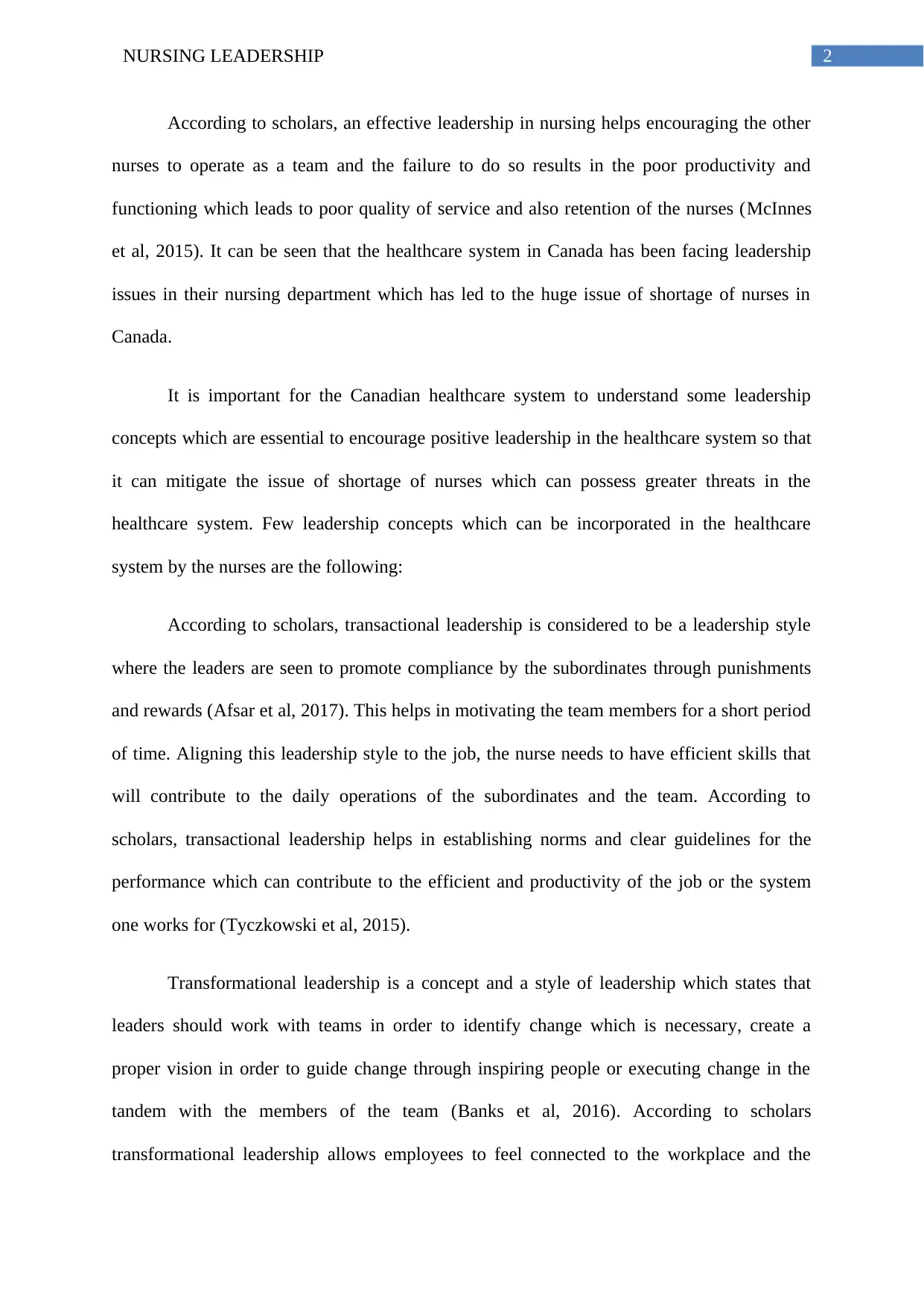
2NURSING LEADERSHIP
According to scholars, an effective leadership in nursing helps encouraging the other
nurses to operate as a team and the failure to do so results in the poor productivity and
functioning which leads to poor quality of service and also retention of the nurses (McInnes
et al, 2015). It can be seen that the healthcare system in Canada has been facing leadership
issues in their nursing department which has led to the huge issue of shortage of nurses in
Canada.
It is important for the Canadian healthcare system to understand some leadership
concepts which are essential to encourage positive leadership in the healthcare system so that
it can mitigate the issue of shortage of nurses which can possess greater threats in the
healthcare system. Few leadership concepts which can be incorporated in the healthcare
system by the nurses are the following:
According to scholars, transactional leadership is considered to be a leadership style
where the leaders are seen to promote compliance by the subordinates through punishments
and rewards (Afsar et al, 2017). This helps in motivating the team members for a short period
of time. Aligning this leadership style to the job, the nurse needs to have efficient skills that
will contribute to the daily operations of the subordinates and the team. According to
scholars, transactional leadership helps in establishing norms and clear guidelines for the
performance which can contribute to the efficient and productivity of the job or the system
one works for (Tyczkowski et al, 2015).
Transformational leadership is a concept and a style of leadership which states that
leaders should work with teams in order to identify change which is necessary, create a
proper vision in order to guide change through inspiring people or executing change in the
tandem with the members of the team (Banks et al, 2016). According to scholars
transformational leadership allows employees to feel connected to the workplace and the
According to scholars, an effective leadership in nursing helps encouraging the other
nurses to operate as a team and the failure to do so results in the poor productivity and
functioning which leads to poor quality of service and also retention of the nurses (McInnes
et al, 2015). It can be seen that the healthcare system in Canada has been facing leadership
issues in their nursing department which has led to the huge issue of shortage of nurses in
Canada.
It is important for the Canadian healthcare system to understand some leadership
concepts which are essential to encourage positive leadership in the healthcare system so that
it can mitigate the issue of shortage of nurses which can possess greater threats in the
healthcare system. Few leadership concepts which can be incorporated in the healthcare
system by the nurses are the following:
According to scholars, transactional leadership is considered to be a leadership style
where the leaders are seen to promote compliance by the subordinates through punishments
and rewards (Afsar et al, 2017). This helps in motivating the team members for a short period
of time. Aligning this leadership style to the job, the nurse needs to have efficient skills that
will contribute to the daily operations of the subordinates and the team. According to
scholars, transactional leadership helps in establishing norms and clear guidelines for the
performance which can contribute to the efficient and productivity of the job or the system
one works for (Tyczkowski et al, 2015).
Transformational leadership is a concept and a style of leadership which states that
leaders should work with teams in order to identify change which is necessary, create a
proper vision in order to guide change through inspiring people or executing change in the
tandem with the members of the team (Banks et al, 2016). According to scholars
transformational leadership allows employees to feel connected to the workplace and the
⊘ This is a preview!⊘
Do you want full access?
Subscribe today to unlock all pages.

Trusted by 1+ million students worldwide
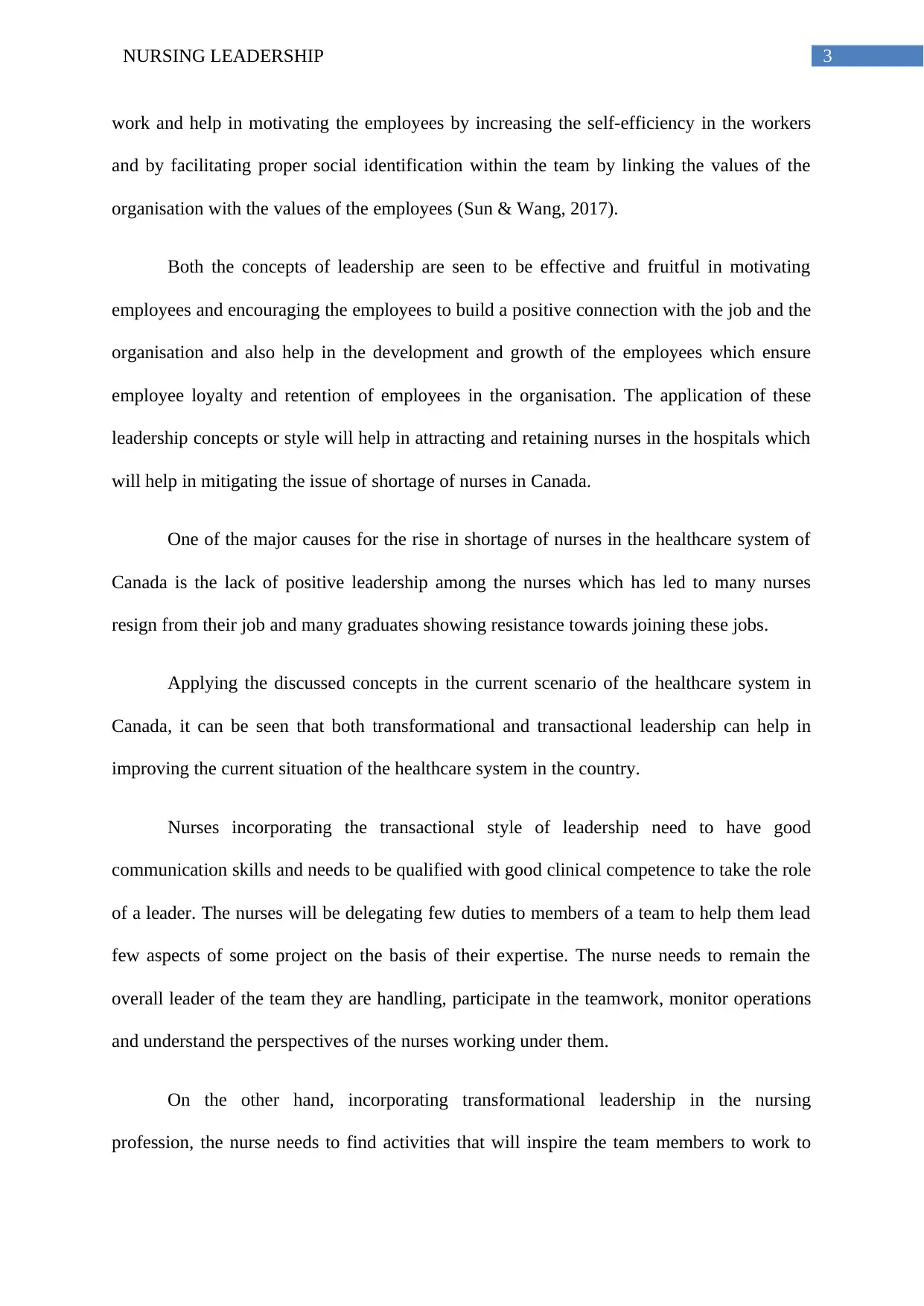
3NURSING LEADERSHIP
work and help in motivating the employees by increasing the self-efficiency in the workers
and by facilitating proper social identification within the team by linking the values of the
organisation with the values of the employees (Sun & Wang, 2017).
Both the concepts of leadership are seen to be effective and fruitful in motivating
employees and encouraging the employees to build a positive connection with the job and the
organisation and also help in the development and growth of the employees which ensure
employee loyalty and retention of employees in the organisation. The application of these
leadership concepts or style will help in attracting and retaining nurses in the hospitals which
will help in mitigating the issue of shortage of nurses in Canada.
One of the major causes for the rise in shortage of nurses in the healthcare system of
Canada is the lack of positive leadership among the nurses which has led to many nurses
resign from their job and many graduates showing resistance towards joining these jobs.
Applying the discussed concepts in the current scenario of the healthcare system in
Canada, it can be seen that both transformational and transactional leadership can help in
improving the current situation of the healthcare system in the country.
Nurses incorporating the transactional style of leadership need to have good
communication skills and needs to be qualified with good clinical competence to take the role
of a leader. The nurses will be delegating few duties to members of a team to help them lead
few aspects of some project on the basis of their expertise. The nurse needs to remain the
overall leader of the team they are handling, participate in the teamwork, monitor operations
and understand the perspectives of the nurses working under them.
On the other hand, incorporating transformational leadership in the nursing
profession, the nurse needs to find activities that will inspire the team members to work to
work and help in motivating the employees by increasing the self-efficiency in the workers
and by facilitating proper social identification within the team by linking the values of the
organisation with the values of the employees (Sun & Wang, 2017).
Both the concepts of leadership are seen to be effective and fruitful in motivating
employees and encouraging the employees to build a positive connection with the job and the
organisation and also help in the development and growth of the employees which ensure
employee loyalty and retention of employees in the organisation. The application of these
leadership concepts or style will help in attracting and retaining nurses in the hospitals which
will help in mitigating the issue of shortage of nurses in Canada.
One of the major causes for the rise in shortage of nurses in the healthcare system of
Canada is the lack of positive leadership among the nurses which has led to many nurses
resign from their job and many graduates showing resistance towards joining these jobs.
Applying the discussed concepts in the current scenario of the healthcare system in
Canada, it can be seen that both transformational and transactional leadership can help in
improving the current situation of the healthcare system in the country.
Nurses incorporating the transactional style of leadership need to have good
communication skills and needs to be qualified with good clinical competence to take the role
of a leader. The nurses will be delegating few duties to members of a team to help them lead
few aspects of some project on the basis of their expertise. The nurse needs to remain the
overall leader of the team they are handling, participate in the teamwork, monitor operations
and understand the perspectives of the nurses working under them.
On the other hand, incorporating transformational leadership in the nursing
profession, the nurse needs to find activities that will inspire the team members to work to
Paraphrase This Document
Need a fresh take? Get an instant paraphrase of this document with our AI Paraphraser
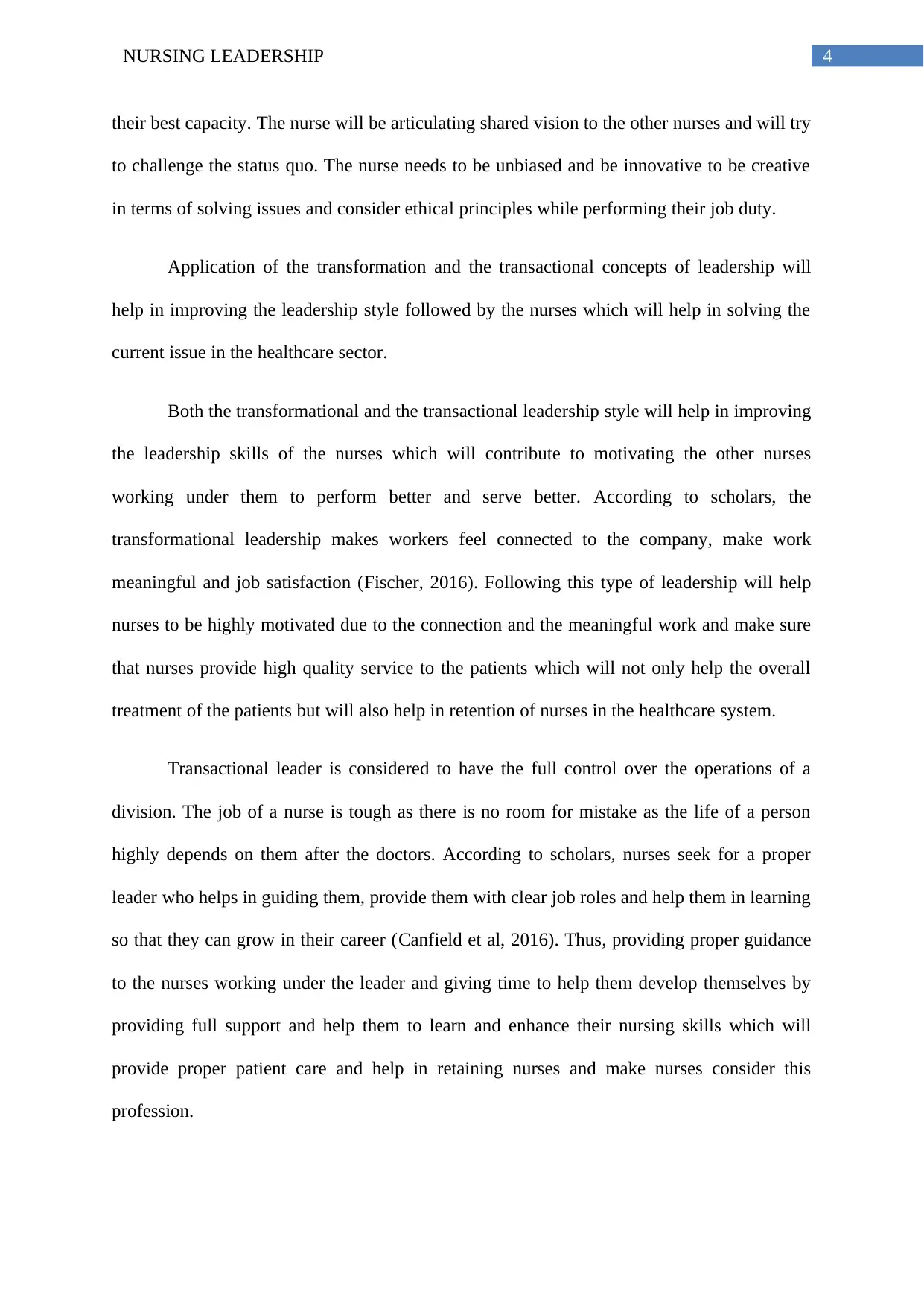
4NURSING LEADERSHIP
their best capacity. The nurse will be articulating shared vision to the other nurses and will try
to challenge the status quo. The nurse needs to be unbiased and be innovative to be creative
in terms of solving issues and consider ethical principles while performing their job duty.
Application of the transformation and the transactional concepts of leadership will
help in improving the leadership style followed by the nurses which will help in solving the
current issue in the healthcare sector.
Both the transformational and the transactional leadership style will help in improving
the leadership skills of the nurses which will contribute to motivating the other nurses
working under them to perform better and serve better. According to scholars, the
transformational leadership makes workers feel connected to the company, make work
meaningful and job satisfaction (Fischer, 2016). Following this type of leadership will help
nurses to be highly motivated due to the connection and the meaningful work and make sure
that nurses provide high quality service to the patients which will not only help the overall
treatment of the patients but will also help in retention of nurses in the healthcare system.
Transactional leader is considered to have the full control over the operations of a
division. The job of a nurse is tough as there is no room for mistake as the life of a person
highly depends on them after the doctors. According to scholars, nurses seek for a proper
leader who helps in guiding them, provide them with clear job roles and help them in learning
so that they can grow in their career (Canfield et al, 2016). Thus, providing proper guidance
to the nurses working under the leader and giving time to help them develop themselves by
providing full support and help them to learn and enhance their nursing skills which will
provide proper patient care and help in retaining nurses and make nurses consider this
profession.
their best capacity. The nurse will be articulating shared vision to the other nurses and will try
to challenge the status quo. The nurse needs to be unbiased and be innovative to be creative
in terms of solving issues and consider ethical principles while performing their job duty.
Application of the transformation and the transactional concepts of leadership will
help in improving the leadership style followed by the nurses which will help in solving the
current issue in the healthcare sector.
Both the transformational and the transactional leadership style will help in improving
the leadership skills of the nurses which will contribute to motivating the other nurses
working under them to perform better and serve better. According to scholars, the
transformational leadership makes workers feel connected to the company, make work
meaningful and job satisfaction (Fischer, 2016). Following this type of leadership will help
nurses to be highly motivated due to the connection and the meaningful work and make sure
that nurses provide high quality service to the patients which will not only help the overall
treatment of the patients but will also help in retention of nurses in the healthcare system.
Transactional leader is considered to have the full control over the operations of a
division. The job of a nurse is tough as there is no room for mistake as the life of a person
highly depends on them after the doctors. According to scholars, nurses seek for a proper
leader who helps in guiding them, provide them with clear job roles and help them in learning
so that they can grow in their career (Canfield et al, 2016). Thus, providing proper guidance
to the nurses working under the leader and giving time to help them develop themselves by
providing full support and help them to learn and enhance their nursing skills which will
provide proper patient care and help in retaining nurses and make nurses consider this
profession.

5NURSING LEADERSHIP
The health system in Canada has been facing immense issue because of the shortage
and the identified reason is the lack of leadership among the nurses who are leaders. It is
important for the nurses to incorporate and learn something from transformation and
transactional leadership style so that the leaders can work efficiently, motivate the other
nurses and also help them develop in their career and provide meaning to their work which
will help in motivating the nurses to provide quality patient care in the healthcare system and
also help in retaining nurses which will help in mitigating the challenge the Canada
healthcare system is facing which is shortage of nurses in the healthcare sector.
The health system in Canada has been facing immense issue because of the shortage
and the identified reason is the lack of leadership among the nurses who are leaders. It is
important for the nurses to incorporate and learn something from transformation and
transactional leadership style so that the leaders can work efficiently, motivate the other
nurses and also help them develop in their career and provide meaning to their work which
will help in motivating the nurses to provide quality patient care in the healthcare system and
also help in retaining nurses which will help in mitigating the challenge the Canada
healthcare system is facing which is shortage of nurses in the healthcare sector.
⊘ This is a preview!⊘
Do you want full access?
Subscribe today to unlock all pages.

Trusted by 1+ million students worldwide

6NURSING LEADERSHIP
Reference
Afsar, B., Badir, Y. F., Saeed, B. B., & Hafeez, S. (2017). Transformational and transactional
leadership and employee’s entrepreneurial behavior in knowledge–intensive
industries. The International Journal of Human Resource Management, 28(2), 307-
332.
Banks, G. C., McCauley, K. D., Gardner, W. L., & Guler, C. E. (2016). A meta-analytic
review of authentic and transformational leadership: A test for redundancy. The
leadership quarterly, 27(4), 634-652.
Canfield, C., Taylor, D., Nagy, K., Strauser, C., VanKerkhove, K., Wills, S., ... & Sorrell, J.
(2016). Critical care nurses’ perceived need for guidance in addressing spirituality in
critically ill patients. American Journal of Critical Care, 25(3), 206-211.
Cohen, J. F., Coleman, E., & Kangethe, M. J. (2016). An importance-performance analysis of
hospital information system attributes: A nurses' perspective. International journal of
medical informatics, 86, 82-90.
Fischer, S. A. (2016). Transformational leadership in nursing: a concept analysis. Journal of
advanced nursing, 72(11), 2644-2653.
Huffingtonpost.ca. (2019). HuffPost is now a part of Verizon Media. Retrieved 30 March
2020, from https://www.huffingtonpost.ca/entry/canada-nursing-
shortage_ca_5de53696e4b0d50f32a64e53
McInnes, S., Peters, K., Bonney, A., & Halcomb, E. (2015). An integrative review of
facilitators and barriers influencing collaboration and teamwork between general
Reference
Afsar, B., Badir, Y. F., Saeed, B. B., & Hafeez, S. (2017). Transformational and transactional
leadership and employee’s entrepreneurial behavior in knowledge–intensive
industries. The International Journal of Human Resource Management, 28(2), 307-
332.
Banks, G. C., McCauley, K. D., Gardner, W. L., & Guler, C. E. (2016). A meta-analytic
review of authentic and transformational leadership: A test for redundancy. The
leadership quarterly, 27(4), 634-652.
Canfield, C., Taylor, D., Nagy, K., Strauser, C., VanKerkhove, K., Wills, S., ... & Sorrell, J.
(2016). Critical care nurses’ perceived need for guidance in addressing spirituality in
critically ill patients. American Journal of Critical Care, 25(3), 206-211.
Cohen, J. F., Coleman, E., & Kangethe, M. J. (2016). An importance-performance analysis of
hospital information system attributes: A nurses' perspective. International journal of
medical informatics, 86, 82-90.
Fischer, S. A. (2016). Transformational leadership in nursing: a concept analysis. Journal of
advanced nursing, 72(11), 2644-2653.
Huffingtonpost.ca. (2019). HuffPost is now a part of Verizon Media. Retrieved 30 March
2020, from https://www.huffingtonpost.ca/entry/canada-nursing-
shortage_ca_5de53696e4b0d50f32a64e53
McInnes, S., Peters, K., Bonney, A., & Halcomb, E. (2015). An integrative review of
facilitators and barriers influencing collaboration and teamwork between general
Paraphrase This Document
Need a fresh take? Get an instant paraphrase of this document with our AI Paraphraser
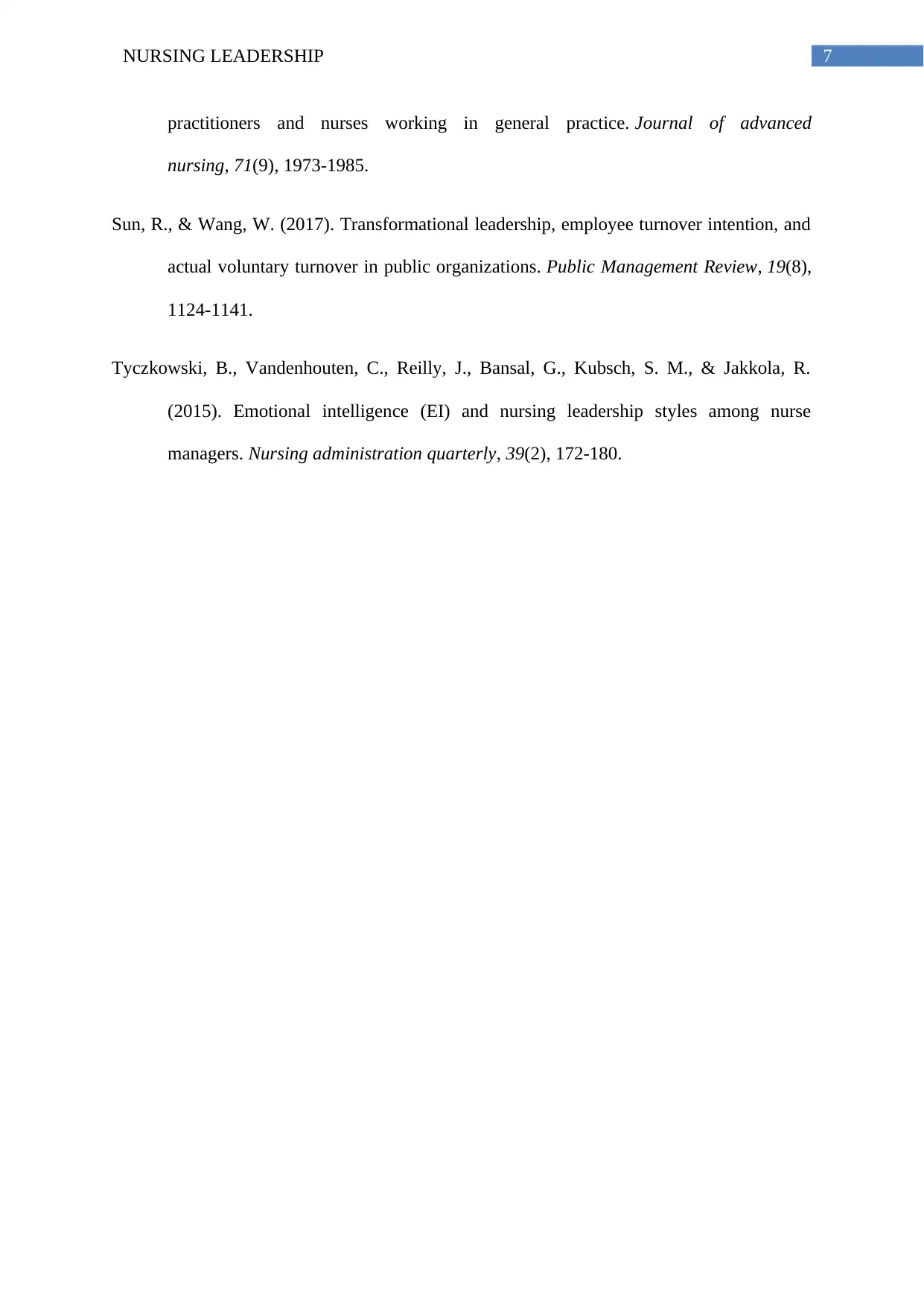
7NURSING LEADERSHIP
practitioners and nurses working in general practice. Journal of advanced
nursing, 71(9), 1973-1985.
Sun, R., & Wang, W. (2017). Transformational leadership, employee turnover intention, and
actual voluntary turnover in public organizations. Public Management Review, 19(8),
1124-1141.
Tyczkowski, B., Vandenhouten, C., Reilly, J., Bansal, G., Kubsch, S. M., & Jakkola, R.
(2015). Emotional intelligence (EI) and nursing leadership styles among nurse
managers. Nursing administration quarterly, 39(2), 172-180.
practitioners and nurses working in general practice. Journal of advanced
nursing, 71(9), 1973-1985.
Sun, R., & Wang, W. (2017). Transformational leadership, employee turnover intention, and
actual voluntary turnover in public organizations. Public Management Review, 19(8),
1124-1141.
Tyczkowski, B., Vandenhouten, C., Reilly, J., Bansal, G., Kubsch, S. M., & Jakkola, R.
(2015). Emotional intelligence (EI) and nursing leadership styles among nurse
managers. Nursing administration quarterly, 39(2), 172-180.
1 out of 8
Related Documents
Your All-in-One AI-Powered Toolkit for Academic Success.
+13062052269
info@desklib.com
Available 24*7 on WhatsApp / Email
![[object Object]](/_next/static/media/star-bottom.7253800d.svg)
Unlock your academic potential
Copyright © 2020–2025 A2Z Services. All Rights Reserved. Developed and managed by ZUCOL.





